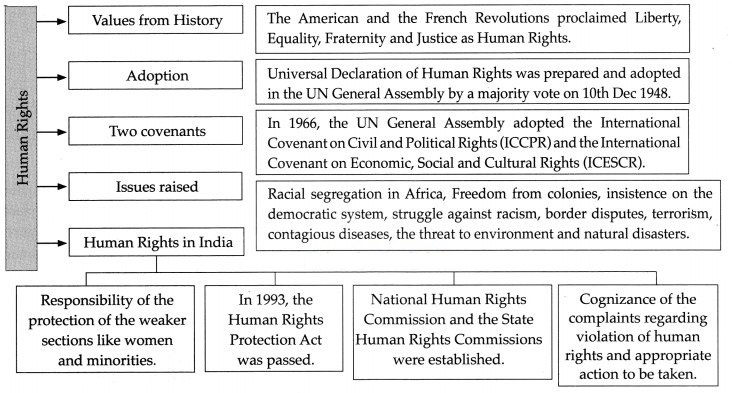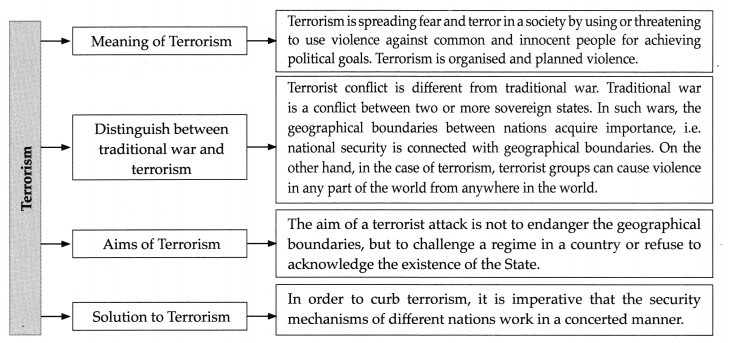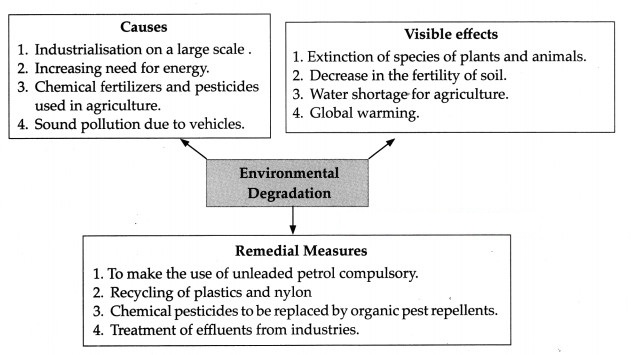Textbook Questions and Answers
1. Choose the right option and rewrite the sentence:
Question 1.
Which among the following is an International problem?
(a) Border dispute between Maharashtra and Karnataka
(b) Kaveri water sharing question
(c) Problems of refugees
(d) Naxalism in Andhra Pradesh
Answer:
(c) Problems of refugees
Question 2.
Which among the following rights are not included in human rights?
(a) Right to work
(b) Right to information
(c) Children’s rights
(d) Equal pay for equal work
Answer:
(b) Right to information
Question 3.
Which among the following days is observed at an international level?
(a) Teachers’ Day
(b) Children’s Day
(c) Earth Day
(d) Flag Day
Answer:
(c) Earth Day
2. Explain with reasons whether the following statements are true or false:
Question 1.
It is necessary that all the nations should cooperate in order to find remedies of environmental degradation.
Answer:
True.
- The threat to the environment caused by pollution or by leakage of oil or gas does not remain restricted to one nation.
- Its effects are long term so it becomes necessary for nations to act with each other’s consent and cooperation in order to deal with these effects.
Question 2.
Sino-Indian relations are friendly.
Answer:
False.
The conflict between India and China is connected to two issues
- Border issue and
- Status of Tibet. India made several efforts to sort this border dispute by means of dialogue. But it has not met with much success.
3. Complete the following chart:
Question 1.
Human Rights
Answer:

Question 2.
Degradation of the Environment
Answer:
Question 3.
Terrorism
Answer:
4. Prepare the following concept map:
Question 1.
Answer:
5. Write your own opinion about :
Question 1.
Explain India’s position in establishing human rights.
Answer:
(i) The Preamble of the Indian Constitution contains the objectives of the Constitution.
(ii) It secures to its citizens: justice, social, economic and political; Liberty of thought, expression, belief, faith and worship; Equality of status and opportunity; and Fraternity assuring the dignity of the individual and unity and integrity of the Nation.
(iii) Fundamental Rights are assured to all the citizens of India.
(iv) In order to make these objectives effective, Fundamental Rights and Directive Principles of State Policy were incorporated in Part III and Part IV of our Constitution.
(v) The Supreme Court of India and the High Courts of all states issue Writs, such as:
- Habeas Corpus
- Mandamus
- Prohibition
- Certiorari
- Quo Warranto to protect human rights.
Question 2.
Narrate the effects of terrorism and suggest remedies to control it.
Answer:
(i) The 21st century terrorism is an organised system of violence and intimidation. There is a need to empathise, understand, cooperate and coordinate our efforts in dealing with terrorism at the national and international level.
(ii) Terrorism includes taking hostages; firing or bombing civilian localities that are undefended such as hospitals or schools, inhuman treatment to prisoners and destruction of property.
(iii) This leads to feeling of insecurity and helplessness among the people who are prone to terrorism. Their faith in social security and police protection is lowered and they may be psychologically affected.
(iv) Terrorism affects economic growth, political stability and social welfare of the people. It burdens our defence and police system as well. Hence the government cannot focus on its constructive programmes.
(v) Citizens should be alert about unattended luggage or bags at public places and be vigilant about suspicious men around them. They must immediately report to the authorities about the same.
(vi) The youth of the nation should volunteer in police and armed forces. The civilians must always cooperate with the police and government authorities to nab the terrorists.
Additional Important Questions and Answers
Choose the correct option from the given options and rewrite the statements:
Question 1.
United Nations Conference on human environment was called at Stockholm from ________.
(a) 5th to 16th June, 1972
(b) 5th to 16th July, 1972
(c) 5th to 16th June, 1971
(d) 5th to 16th July 1971
Answer:
5th to 16th June, 1972
Question 2.
The United Nations General Assembly adopted the International Covenant on Civil and Political Rights (ICCPR) in ______.
(a) 1948
(b) 1966
(c) 1964
(d) 1962
Answer:
1966
Question 3.
In 1997, the conference at Kyoto laid down the protocols for the developed countries for preventing climate change. For how many years did it come to be applied?
(a) 10 years
(b) 12 years
(c) 15 years
(d) 16 years
Answer:
15 years
Question 4.
How many Articles are there in the United Nations Declaration of Human Rights?
(a) 30
(b) 20
(c) 40
(d) 50
Answer:
30
Question 5.
When was the Declaration of the Rights of Child proclaimed?
(a) 30th November 1959
(b) 20th November 1959
(c) 20th December 1959
(d) 30th December 1959
Answer:
20th November 1959
Question 6.
When was the first Earth Day celebrated?
(a) 21st April, 1970
(b) 22nd April, 1970
(c) 23rd April, 1970
(d) 20th April, 1970
Answer:
22nd April, 1970
Question 7.
What led to the boycott of the regime in South Africa?
(a) Expatriation of Prisoners of War
(b) Racial Segregation
(c) Disobedience of the UN
(d) Asylum to international terrorists
Answer:
Racial Segregation
Question 8.
Which conference in 1997 laid down the protocols for developed countries for prevention of climatic changes?
(a) Conference at Copenhagen
(b) Conference at Amsterdam
(c) Conference at Kyoto
(d) Conference at Shimla
Answer:
(c) Conference at Kyoto
Question 9.
Which institute/organisation is responsible for taking action against violation of human rights?
(a) Self Help Groups and NGOs
(b) Human Rights Commission
(c) Corporate bodies
(d) National Investigation Agency
Answer:
Human Rights Commission
State whether the following statements are true or false with reasons:
Question 1.
Human rights are necessary for living as a human being.
Answer:
True.
The concept of human rights has emerged from the concept of natural rights. Natural rights are those rights that we are endowed with because we are bom as human beings. In the same vein, human rights are those rights that are necessary for living as a human being.
Question 2.
The scope of human rights is limited.
Answer:
False.
The scope of human rights has in fact, broadened due to several issues of global nature like contagious diseases, the threat to environment, natural disasters, etc. Human rights today also include goals like protection of the environment and sustainable development.
Question 3.
Only internal security is threatened due to terrorist attacks.
Answer:
False.
The aim of a terrorist attack is not to endanger the geographical boundaries, but to challenge a regime in a country or refuse to acknowledge the existence of the State. This means that due to increasing terrorism, the internal security of a country is threatened in addition to its external security.
Question 4.
Once the refugees reach a safe place, they have new challenges.
Answer:
True.
Once the refugees reach a safe place, they need to find work, a place to live and other problems of a day to day nature. If the language and culture in the other nation are different, then adjusting to that poses difficulties. There is also no assurance that the people of a nation which gives shelter to the refugees will accept them.
Explain the concept:
Question 1.
Human Rights
Answer:
The concept of human rights has emerged from the concept of natural rights. Natural rights are those rights that we are endowed with because we are born as human beings. Human rights are those rights that are necessary for living as a human being and as a constituent of society.
Question 2.
Refugees
Answer:
People who have to leave their motherland against their wishes or are forced to go to other nations, seeking refuge or for security are called as refugees. People become refugees due to torture or persecution for belonging to a particular race or religion, due to war or a disaster, etc. In such situations people are forced to leave their own country and seek shelter in another country.
Question 3.
Terrorism
Answer:
Terrorism is spreading fear and terror in a society by using or threatening to use violence against common and innocent people for achieving political goals. Terrorism can be described as organised and planned violence.
Question 4.
Traditional War
Answer:
Traditional war is a conflict between two or more sovereign states. In such wars, the geographical boundaries between nations acquire importance, i.e. national security is connected with geographical boundaries.
Question 5.
Stockholm Conference 1972.
Answer:
(i) In order to discuss the immediate and long term problems related to the environment and to find solutions on them, a United Nations Conference on human environment was called at Stockholm from 5th to 16th June, 1972.
(ii) It was stressed that it is the responsibility of all nations to cooperate to overcome pollution.
(iii) The developing nations feel that the developed nations are more responsible for the decline of the environment and they should take the responsibility for stopping the decline.
(iv) Non-governmental organisations working in the field of environmental protection were also present and assumed a bigger role in the decision making process at international conferences regarding the environment.
(v) The issue of the protection of the common global wealth was raised.
(vi) A consensus emerged that it was the responsibility of all the nations to protect these resources.
(vii) It was after this conference that the United Nations created the United Nations Environment Programme (UNEP).
(viii) Many international treaties about environment were signed after this conference.
(ix) Several rules were made about the protection of environment. Environmental movements started on a large scale at national as well as at the international level.
Complete the following Chart/Concept Maps:
Question 1.
Answer:
Question 2.
Answer:
Answer the following questions in brief:
Question 1.
Which difficulties are faced by people who are forced to leave their own country?
Answer:
(i) When people of any country are forced to leave their own country as refugees, they have to face many problems.
(ii) The most important problem is to decide where to go. They have questions like will that nation give us shelter.
(iii) Secondly, they have to also take along with them other members of their family. It involves a lot of physical and emotional stress.
(iv) Apart from this, there are problems caused by natural elements like heat, rain, storms, as well as shortages of food, sickness, an enemy in pursuit, etc. In this process, many people lose their lives.
Question 2.
What was the Stockholm Conference of 1972 about?
Answer:
In order to discuss the immediate and long-term problems related to the environment and to find solutions to them, a United Nations Conference on human-environment was called at Stockholm from 5th to 16th June 1972.
Question 3.
What are the new challenges faced by refugees on reaching a safe place?
Answer:
(i) Once the refugees reach a safe place, they have new challenges. They need to find work, a place to live and other problems of a day to day nature.
(ii) If the language and culture in the other nation are different, then adjusting to that poses difficulties. There is no assurance that the people in the nation which gives shelter to the refugees will accept them.
Question 4.
What did the Environmental Conference of Rio (1992) emphasise on?
Answer:
(i) In this conference, the idea of sustainable development was stressed upon.
(ii) Different treaties regarding bio-diversity, climate change due to greenhouse gases, protection of forests, etc. were signed.
Question 5.
State the highlights of the conference on climatic change at Paris (2015).
Answer:
(i) A conference on climate change was held at Paris in November 2015.
(ii) An appeal was made in this conference that all nations should make concerted efforts to stop climate change and global warming and that the developed countries should help the developing countries to acquire the technology to achieve these goals.
Question 6.
What measures have been taken so far to save the refugees?
Answer:
(i) In 1951, some provisions were made regarding the question of refugees at the international level. One such provision was that the refugees will not be forcefully sent back to their country against their wishes.
(ii) Similarly an office of the High Commissioner of the United Nations has been established to solve their problems.
Question 7.
Give some examples of refugees.
Answer:
(i) Before the Second World War, the Jews were tortured in Germany.
(ii) Their citizenships and properties were confiscated. Due to this, the Jews became refugees.
(iii) In 1971, the people in East Pakistan turned refugees and came to India seeking refuge due to political and religious persecution.
(iv) In the last few years due to the war-like situation in Iraq and Syria, a lot of people are leaving Syria as refugees. We can cite many such example of refugees.
Question 8.
Which problems are faced by the host nation that agrees to provide shelter to the refugees?
Answer:
(i) As the number of refugees increases, the strain on the economy of the host nation increases. A shortage of essential goods is created; there may be an increase in crime or even inflation.
(ii) The locals may lose their jobs; a problem of law and order may crop up. Many such problems may emerge.
(iii) Due to these problems, many nations are not ready to give shelter to refugees and to resettle them.
Question 9.
Which steps can be taken for preservation of human rights?
Answer:
(i) If all nations safeguarded and fostered human rights, exploitation and violence would reduce. All people would be able to achieve their own development safely and securely.
(ii) Human rights could be more effectively implemented if the environment is safeguarded and if terrorism is completely wiped out.
(iii) No group of people will have to become refugees. For this, all nations have to come together, cooperate with each other, take concrete action and bring about actual change.
Question 10.
Many nations are not ready to give shelter to refugees. Why?
Answer:
Many nations are not prepared to give shelter to refugees because:
- As the number of refugees increases, the strain on the economy of the host nation increases.
- A shortage of essential goods is created; there may be an increase in crime or even inflation.
- The locals may lose their jobs; a problem of law and order may crop up.
- Many such problems may emerge.
Question 11.
The problems relating to the environment are inherently of a global nature. How?
Answer:
(i) The threat to the environment caused by pollution or by leakage of oil or gas does not remain restricted to one nation.
(ii) The visible effects of the decline of environment are extinction of species of plants and animals, decrease in the fertility of soil, water shortage, fluctuation in the proportion of rainfall, global warming, drying up of rivers and lakes, pollution of rivers and seas, incidence of newer diseases, acid rain, thinning of the ozone layer, etc.
(iii) Even if some of the effects are restricted to particular nations, these problems reach global proportions due to their long term effects, while some problems are inherently of a global nature.
Question 12.
How is terrorist war different from traditional war?
Answer:
(i) Terrorist conflict is different from traditional war.
(ii) Traditional war is a conflict between two or more sovereign states.
(iii) In such wars, the geographical boundaries between nations acquire importance, i.e. national security is connected with geographical boundaries.
(iv) On the other hand, in the case of terrorism, terrorist groups can cause violence in any part of the world from anywhere in the world.
(v) The aim of a terrorist attack is not to endanger the geographical boundaries, but to challenge a regime in a country or refuse to acknowledge the existence of the state.
